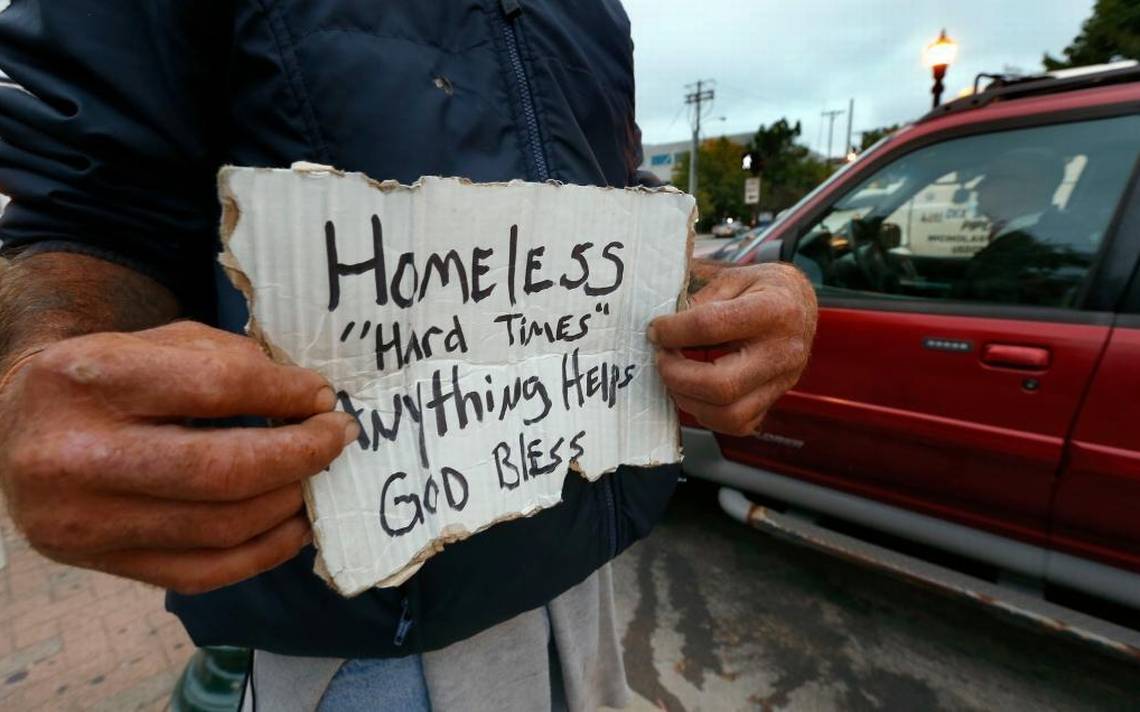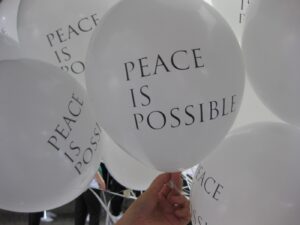
Hope Street: Navigating My Way Through Homelessness (Part 5) ~ While I was homeless and since, I’ve grappled with the reality of panhandling. Is it right? Is it truly one person being generous to another? Or, is it dependence of some sort? A shirking of responsibility? When some 49.2 percent of U.S. households receive benefits from one or more government programs (about 151 million out of an estimated 306.8 million Americans), I guess it all depends on how far we want to go in asking these questions.
A homeless person out panhandling is a blatant reminder that life has its extreme ups and downs; it’s a reminder that each of our lives are fragile and the illusory “security” we clutch onto could be fleeting after all. Unless one has lost everything, it’s hard to see it that clearly. Not too many people alive still remember the begging in the streets during the Great Depression in America. The Salvation Army ringers at Christmastime are one of the last remnants of that age.
Now, with homelessness at an all-time peak in America, towns and cities are beginning to deal with the issue. Some towns are trying to eradicate homelessness by enacting more laws. Some have resorted to all out bans on panhandling, along with giving the homeless hefty misdemeanor “camping” fines for being caught by the police sleeping outside. (While homeless in Corpus Christi, my friend James and I were each issued a $105 camping ticket. Though we found the money to pay the city, many homeless people get put in jail for failure to appear in court for the misdemeanor, or just leave town, which is I believe the whole idea in the first place. It’s a way to get the homeless into the system and off the streets, or out of sight.)
Refer to the excellent article, “Anti-Panhandling Laws Spread, Face Legal Challenges” by Teresa Wiltz (November 12, 2015, The Pew Charitable Trusts) for more details on panhandling and homeless laws across the U.S.
The homeless are indeed the “poster kids,” the visible tip of the iceberg, while the many more poor in America are drowning beneath. Both Wilmington, N.C. and Corpus Christi, TX, two towns where I lived, have bans on panhandling in the high-tourism areas of town. Like other cities, Corpus is also exploring a ban against people being able to feed the homeless unless the food is cooked in a government-approved kitchen. Talk about government interference. Outlawing generosity can never be achieved, don’t they know? (Refer to the National Coalition for the Homeless 2014 Report.)
One day when I was homeless in Corpus Christi having lunch at a city park with friends before heading to my call center job, I saw a young couple a short block away walking with some grocery bags. I looked over at them, smiled, and waved. Much to my surprise, they started yelling obscenities at us. “You f—– bums, go get a job!” It took me a few minutes of reflecting on why they would call us names before I realized that we were a raw reminder of a life on the streets from which they just worked so hard to escape. They knew the life and lashed out, while others who have not been homeless sometimes judge the life without taking the time to look a little deeper. Even into someone’s eyes.
Most homeless, including panhandlers, are caught in a cycle. They alternate from being homeless to having housing but being very poor. When I worked in a soup kitchen in Fort Walton Beach, Fla, that was true. About half of the people coming each week were homeless and the other half were off the streets but struggling. I learned that firsthand. Making $12.00 a hour, working overtime, it took me three months on the streets to save enough up to pay for the security deposit and first month’s rent on a small apartment in a questionable neighborhood. Many people who are homeless don’t have my education and skills and have been in the cycle so long they’ve lost hope that life can be different. Much like we’re close to losing hope collectively that the homeless situation can be solved. (It can.)
Panhandling is a just a modern word for begging, or as they used to call it, alms giving. There is a long history of begging on this planet. Unlike Miriam-Webster’s modern derogatory definition of panhandling (“to accost on the street and beg for food or money”), begging has not always been regarded as demeaning. Much the opposite.
In his March 2017 article “Begging Without Shame,” Fr. Thomas Nairn, the senior director of theology and ethics at the Catholic Health Association in St. Louis writes: “In the early 13th century in Europe, the so-called mendicant (monastic) orders were itinerant preachers, moving from town to town. They went about two by two and were to ‘take nothing for the journey, neither knapsack, nor purse, nor bread, nor money nor walking stick’ (references to Matthew 10, Mark 6, and Luke 9).” It was a training in humility.
The monks begged as needed along their journeys, following St. Francis of Asissi’s “Earlier Rule,” advocating “gifts between friends.” The Earlier Rule reads: “When a friend asks for a gift from a friend, he violates no law; neither the first friend by his asking, nor the second friend by his giving, nor again the first by his accepting. The law of charity and divine love involves a greater exchange than the law of society.”
The Zen Buddhism practice of takuhatsu is much the same. As Eido Frances Carney wrote in Tricycle in the Fall of 1998: “It is the tradition in Zen practice for monks to go on rounds, holding their eating bowls to receive offerings. The person who gives places the offering in the bowl and the monk acknowledges this by chanting a verse that acknowledges gratitude, as the giver and the receiver are one. They then bow to one another in mutual gratitude and respect. Both parties are recipients. Together they are the teaching.”
I used to be against panhandling completely, figuring it was a cop out and an excuse. Now, I have a different opinion.
While homeless and hitchhiking, I figured people could see my need and would give if they felt so inclined. And, they did. Most gave $5 or $10, while some amazingly gave $100 bills, at the exact time we needed it most. The night of November 18, 2013 in Springfield, Missouri was the exception. That night I became a beggar. James and I, and our sweet dog Curious George, had been waiting at a Walmart. My mom was going to wire me $100 for my birthday the next day. We had lightweight jackets and two small blankets and it was the coldest day on the road so far.
When it got to be after 9:00 p.m. and down to 20 degrees and I saw James and Curious George shivering, I couldn’t stand it anymore. We needed shelter and we needed it fast. I had $17. I went to a small motel and asked the night attendant how much a room would cost with tax. He said 40 bucks. I talked him down to 30. I went over to a Chili’s restaurant across the street, and as the people came out to their cars, I’ll never forget approaching them.
I swallowed my pride and said;” “Excuse me, I am sorry to bother you. I have never done this before. My friend and my dog are really cold, and we need twelve more dollars to get into that motel tonight,” pointing across the parking lot. The first group, an older man and his wife, gave me a five dollar bill, followed by two girls in their twenties ten minutes later, who gave me the last $8.00 we needed. One of the girls said, “My mom who’s about your age was homeless for a while, I’m glad to help.” Thanks to their generosity, we slept inside (on a bed!) that night.
Though panhandling was not my regular “go to” while homeless, I don’t look down on it anymore. Who am I to judge? I figure, a person should decide if they want to panhandle and another person should decide if they want to give. That is their prerogative, no one else’s business. Being kind can never be controlled by any person or any governmental entity. I have known people who panhandle daily and some who panhandle as needed.
In Tallahassee, a man named Keith panhandles on two different corners pretty much every day, calling the people who give him money his friends. A woman I knew in Wilmington, who stood a good six feet tall, would go out every Friday to the same busy corner near the bridge and beg until she got $150 for the week. She had no guilt, no pride, no shame. She saw it as a necessity of life until her life changed. Later, I heard she moved out of state to live with her daughter.
All of these situations point to the fact that many U.S. citizens do not have the resources to take care of themselves or their families. While at the same time, according to National Priorities Project, in 2016, the U.S. government spent 64 percent of its discretionary budget on the military, incarceration, immigration, and “war” on drugs – not on people.
If we work on solving the immediate problems of personal livelihood in America, if we address homelessness like we really care about the people involved (for they could be us), we’d be spending a lot more energy on peace efforts, rather than on further militarization. And, we’d be electing people for their compassion, ingenuity, and ability to bring about change for the benefit of the people, protecting our shared human dignity first and foremost. Those are the prerequisites for the new populist leaders in America as we move forward together.
(This article was originally published in Spring 2017.)

